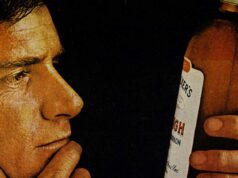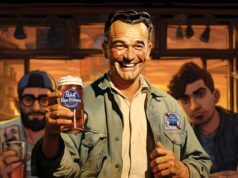Try to picture Sam Spade or Philip Marlowe without free and frequent access to the hard stuff, and your mind’s eye is likely to shift to the smarmy tea-sipping detectives in the British “cozies.”
Though the guzzling gumshoes of the 30’s and 40’s evolved from those eloquent pipe-smoking dandies, they have as much in common as rotgut rye and Earl Grey tea. First off, the American private eye didn’t have the luxury of solving a crime by summoning the well-heeled suspects into the drawing room of a country mansion. No, the bastard had to grit his teeth, go out into the mean streets, grab hold of the fuckers and drag them, screaming, kicking and oftentimes shooting, to justice. Secondly, they pounded the hooch like it was their job.
In a sense, it was their job. At least an integral part of it. Of all literary genres, none is more inextricably bonded to alcohol than the hard-boiled private dick. During their journey from the pages of Depression-era pulp magazines to best-selling novels and finally into the packed movie-houses of America, the P.I. seemed to spend as much time solving cases of whiskey as he did solving cases of crime.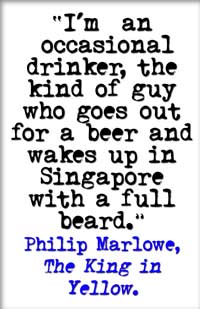
The epitome of functional drunks, booze never got in the way of the case, it propelled it forward, it was a soothing pit stop in between the violent and inevitable clashes with the forces of corruption and evil, a salve equally good at soothing brutal punches to the gut and dark, nihilistic thoughts in the head.
They were solitary men, given to drinking alone and suspicious of long-term relationships. They absorbed assorted beatings, bullets and betrayals, and shrugged them off with a wisecrack and a belt of bourbon. They lived in the twilight world between crooked cop and ruthless gangster, between high-society dames with automatics in their purses and psychopathic blackmailers, all the while maintaining a strict self-imposed moral code.
They certainly weren’t in it for the money, as Marlowe rather sarcastically asserts in The Big Sleep: “I am so money greedy that for twenty-five bucks a day and expenses, mostly gasoline and whiskey, I do my thinking myself, what there is of it. I dodge bullets and eat saps, and say thank you very much.”
And so, bereft of allies and surrounded by enemies, the P.I. had but one all-weather friend to turn to, and it sure as hell wasn’t a cup of Darjeeling. They palled up with booze and they kept their pal close at hand: a pint in the glove box, a flask on the hip, and most famously, the fifth in the desk. They were as inseparable as a butter-and-egg man and a hooch-cooch in a gin-mill (see the glossary, ace) and they didn’t care who knew it.
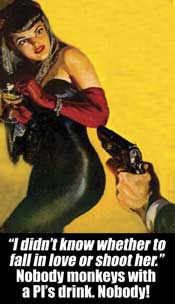 The Office Bottle
The Office Bottle
Every gumshoe worth the sign on his door had one. Lower left hand drawer. A swallow less than half full and never dusty. It jumped out at the least opportunity, ready to calm a client, fend off a flat foot, loosen a tongue and thrust the plot and protagonist into wild new directions. If he offered you a slug from the bottle he either liked you, was testing you, or didn’t want to drink alone.
If asked to put a name to their poison, they’d call rye, corn, booze, hooch, eel juice or rotgut. Especially rye. Raw and uniquely American, it was good for separating the men from the boys and the shellac from the desktop. Bourbon came in a close second, rum limped in after the bleachers had cleared. They didn’t have time to pound a twelve-pack of beer or muse over a bottle of Beaujolais; they needed a quick high-proof fix, a fast belt of the hard stuff to smooth things out and move them along.
They drank it out of flasks, fifths, pints, half-pints, water glasses and paper cups. They didn’t sip it with pinky extended, they put it down, knocked it back, slugged it down, belted it, threw it down the hatch, dipped the bill, tipped it up and lit the roof on fire. Sometimes they even nibbled it. No matter how they got it down, they got it there often, with little pretense, and for plenty of reasons. If he was waiting for a phone to ring he poured a drink. If he needed an appetite, he had a belt. If he didn’t like the way the paint was peeling off the ceiling, he dipped his bill. And sometimes he had even better excuses. In the difficult and oftentimes disturbing world of the urban P.I., booze had more uses than a billion bucks in Babylon.
Calming the Client
Before he could take on a case, he had to have a client. It was usually a she, and she showed up in a fragile condition, teetering on the brink of hysteria. So out comes the bottle, to calm her, to provide a liquid crutch to help her lurch through her awful tale.
The offer of a drink was also used as a test. If a client accepted the offer, but squinched his nose at the cheap hooch, he were probably from the upper classes. If he turned it down flat, he was either a straight-laced teetotaler or a drinker who didn’t care to have his tongue loosened. If it was the client who was pouring the drinks, a gumshoe never stuck his nose up, even if it meant drinking brandy, wine, champagne or tropical surprises. He was too honorable and practical a man to insult a potential paycheck, and hey — no matter how many flowers they stick in it, a glass of booze is still a glass of booze.
Boozing for Clues
Once he had a case, he had to come up with some clues. The search inevitably led him through a dangerous maze of dive bars, gangster-run nightclubs and skid row tenements where the locals were as likely to ball a fist as buy you a beer. Bars were considered a prime spot to dig for clues, not to mention a great place for some mid-case refreshment. Properly handled, the bartender was a gold mine of information. He existed in a world of loose tongues and if he took a liking to you, he could point you down the right road. If he didn’t like you, you might end up with a colorful exchange like this gem from Raymond Chandler’s The High Window:
Marlowe: “A dry martini will do.”
Bartender: “A martini. Dry. Veddy, veddy dry.”
Marlowe: “Okay.”
Bartender: “Will you eat it with a spoon or a knife and fork?”
Marlowe: “Just cut it in strips,” I said. “I’ll just nibble it.”
Bartender: “On your way to school,” he said. “Should I put the olive in a bag for you?”
Marlowe: “Sock me on the nose with it,” I said. “If it will make you feel any better.”
Eventually he’d stumble across some suspects, and how those suspects drank revealed a great deal about their personalities and motives. If a dame is pouring down the hard stuff with a sour face, she’s probably trying to erase something from her past, perhaps a dark secret that would shed light on the case. Conversely, if she forgets the drink in her hand exists, she’s either made nervous by your questions or distracted by a secret buzzing around in her head. Mortal fear could also inspire a powerful thirst. If the you’re standing in a mobster’s office and he doesn’t offer you a taste, he doesn’t like you in the picture. If he does pour you a drink, he’s either trying to poison you or find out how much you know.
Sometimes, during a question and answer session, a lot of belts had to make the trip down the hatch. While discussing the Maltese Falcon with fortune-hunter Caspar Gutman, Sam Spade has to put down five scotch and sodas. He probably would have drank even more if the fifth wasn’t spiked with knockout drops (when he wakes up twelve hours later, he blames the knockout drops and a kick to the temple for his headache, natch).
Bottles of good hooch were currency in the poorer parts of town, and served as an excellent bribe for hotel clerks and dock workers. “Call your play,” the P.I. would tell them. “I’ll read you a chapter of the Bible or buy you a drink. Say which.” Usually they passed on the psalms, as demonstrated in The High Window: “He picked the glass up and tasted it and sighed again and shook his head sideways with a half smile; the way a man does when you give him a drink and he needs it very badly and it is just right and the first swallow is like a peek into a cleaner, sunnier, brighter world.”
When he had to stake out a location, the gumshoe often brought a pint of hooch along to keep himself “warm and interested.” And, later, if he tired of his chore, he didn’t suck on a can of Red Bull or some other sissy sauce. He threw together “a little black coffee and a smattering of rye.”
Brother, those were the days.
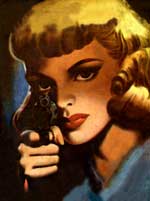 Dealing with the Dames
Dealing with the Dames
Ah, the dames. The skirts, the twists, the booze blondes, the gin molls. They came on with lust in their eyes and automatics in their mits, and if you were lucky they might even scram before you woke up. The average P.I. had plenty of experience with them, but had yet to figure out what made them tick. They understood that “dames lie about anything — just for practice,” that they “could get as drunk as two sailors and love it,” and some were “full of sunshine and common sense and knew judo from the ground up and could toss a truck driver over her shoulder without missing more than one sentence out of the editorial in the Saturday Review.”
The molls packed a four-hour magic show’s worth of tricks, but the P.I. usually wasn’t buying any: “She swung around and marched to the door and put her hand on the knob and then she swung around again and marched back and suddenly began to cry. I reacted to that just the way a stuffed fish reacts to cut bait.”
When the gumshoe did buy into the act, they often found themselves in a hole sometimes even booze couldn’t dig them out of, as Marlowe relates: “I went out to the kitchen and gobbled a quick drink, before we started. It didn’t do me any good. It just made me want to climb up the wall and gnaw my way across the ceiling.” And later: “You can have a hangover from other things than alcohol. I had one from women.”
And when the dame took a powder, it was even worse: “I stopped in a bar and had a couple double Scotches. They didn’t do me any good. All they did was make me think of Silver-Wig, and I never saw her again.”
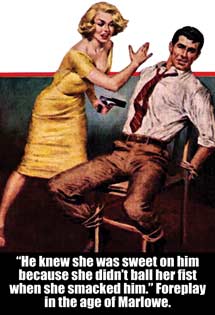 Confronting the Bad Guys
Confronting the Bad Guys
“Down these Mean Streets a man must go who himself is not mean, who is neither tarnished nor afraid,” Chandler explained in his essay The Simple Art of Murder, and sometimes the P.I. wasn’t afraid because he was loaded. For all their existential patter, Marlowe and Spade sometimes were scared. They had learned a long time ago they weren’t bulletproof, and they certainly didn’t want to die or even be maimed. But sometimes you have to walk through the propeller blade just to see what’s on the other side and bourbon made the trip a hell of a lot easier to take. Not because they were weak men in need of a crutch — they would take that walk regardless, their code gave them no choice — it was just that they’d been down that street so many times they possessed a fatalistic, nearly morbid understanding of what was coming their way. And what manner of sadist would blame them for bracing themselves for the punishment with a little hooch?
The urban underworld was an evil and violent machine, and when an honest P.I. inserted himself inside, the machine started having dangerous fits, the gears started lurching and grinding, trying to crush what was preventing its natural operation. Violence, sometimes passionate, sometimes mechanical, almost always ensued.
What happened next was as inevitable and accepted as a rotgut hangover. The gumshoe was usually a big guy and an accomplished fighter; in a fair fight he’d win the brawl hands down. But that wasn’t how the machine worked, when it wanted to punish an intruder it sent around three guys who made a living out of cracking skulls.
Sometimes it was his smart mouth that earned him the beating, but most likely it was designed to ward him off. Not that it ever did. Why should it? No matter how much they could dish out, the gumshoe understood he had plenty of the right kind of medicine to make the pain go bye-bye.
When he woke up he poured a little on the wounds and poured the rest inside to numb the pain and, occasionally, the psyche. For the gumshoe wasn’t gifted with an in-built psychic shield against the ugliness swarming around him. They were not unemotional robots that could shrug off brutal violence, shattered bodies, and underhanded treachery. The horror was right on top of them and over time they learned to absorb and endure. With the help of the bottle. Each belt beat back the black tide a little, until it was far enough away to shrug at. And swear revenge against.
Fucking with the Flatfoots
The cops were always sticking their noses in. Sometimes because they actually wanted to solve the crime, sometimes because they were on the payroll of the criminals. Their favorite tactic was the shakedown, and if the PI didn’t handle it right he’d either find himself cooling his heels in the hooskow or eating a sap sandwich. The master of handling the shakedown was Sam Spade in Dashiell Hammett’s The Maltese Falcon, and here’s how he did it:
Anatomy of a Shakedown
Sam’s partner has been gunned down. After identifying the body, Sam returns to his apartment and begins the process of grieving, as defined by the code of the guzzling gumshoe. He pours a glass of Barcardi rum, neat. He drinks it standing up. He rolls a cigarette. Two more glasses and five smokes later, the doorbell rings and he figures it’s his ex-partner’s widow, with whom he’s been having an affair.
Instead, it’s the coppers. A detective with whom he is familiar and a lieutenant with whom he is not. Spade pours them and himself a drink, toasts them cynically with “Here’s to crime,” downs his, then watches his guests closely.
The detective drinks his down and puts the glass on the floor near his feet and Spade knows this is a man he may be able to work with. The lieutenant stares at his glass for a dozen seconds, takes a very small sip and sets it on a table, and Spade immediately knows he’s going to be a hard case. And he’s right. The detective plays it easy, but the lieutenant starts in with the accusations. He doesn’t get far, because Spade already has him sized up, from the moment he snubbed the glass of rum. A wicked exchange of poorly-veiled threats ensues, during which Sam helps himself to another glass of rum. The policemen wonder if Spade is interested in catching his partner’s killer or just getting hammered, and Sam informs them, “I’ll bury my dead.” And he does. In rum. When it’s time for the coppers to depart, Sam insists the lieutenant finish his drink. He does, and Sam knows he can dominate this man.
Guzzling Through the Puzzle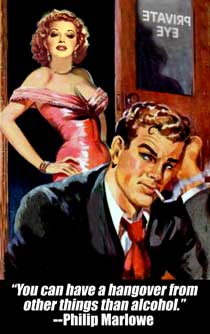
When he came home with his nasty and tangled bag of clues, the PI had to sort through them. With so many treacherous players involved, the case oftentimes twisted into a puzzle that makes the Gordian Knot appear a bow tie. And much as Alexander the Great used a sword to solve the knot, the gumshoe employed the bottle to cut through the lies and deceptions until a little light showed through.
The image of a private dick gazing out his office window, a Lucky in one and a stiff drink in the other, is nearly a cliche. He isn’t looking for culprits on the street, he’s mentally sifting for truths. When there was heavy brainwork to be done, he understood the best cerebral lubricant was the humble bottle in his desk. When Marlowe needed to crack the code of an encrypted address book in The Big Sleep, he cracks open a bottle of whiskey and fixes up some hot toddies. And later, deep into the night, when the jumble in his head won’t let him sleep, well, it’s a good thing they sell lullabies by the bottle.
Wrapping It Up
A couple a beatings, a flurry of gunshots and some fancy footwork later, and the case is wrapped up in a nasty little package indeed. Some of the bad guys are dead or headed to the cooler, some of them get away, and all the good guys can do is lick their wounds and wait for the next chance to put their lives on the line for twenty-five bucks a day plus expenses. The last page often resembles the first: a lonely man in a lonely room with the bottle for company.
He’s “as empty as the spaces between the stars” and so is the glass on his desk. So he reaches for the bottle and fills it up and drinks it down. Not a celebratory drink, that’d be like cheering a train wreck that you somehow crawled away from, barely alive. No, he drinks because living men drink and dead men lay in the grave, sleeping the big sleep.
Drink by drink, belt by belt, he fills his soul back up. Booze, he knows, can provide cheap, easy and oftentimes sham emotions, and anything is better than nothing.
12 Steppers and Beer Sippers: The New Breed of Private Dick
“Mike Hammer drinks beer because I can’t spell cognac.” —Mickey Spillane
Well, at least Mickey had an excuse. The current batch of hardboiled writers probably can spell cognac, and whiskey, for that matter, but that doesn’t stop them from turning out a gang of pansies. Detective Nero Wolf sips his own homebrew, Zen Moses is a microbrew snob, Spenser prefers imported beer, Hercule Poirot, for crissakes, is addicted to chocolate. Rarely do they get outright drunk. If they accidentally do, heaven forbid, they feel just awful about it the next morning. In other words, they don’t drink like men anymore: they drink like college freshmen.
A few of them keep a bottle in the desk, but it has the habit of getting dusty in between infrequent binges. They don’t use it lubricate their journey down the mean streets, it’s fuel for the fires of self-hatred.
Worst of all are the hard boozers who started well then were terrified into A.A. meetings. They spend long afternoons and whole chapters probing their tender feelings and coddling their inner children, when they should be shutting the whiny brat up with a belt of bourbon.
In Marlowe and Spade’s day, booze was always an answer and never a question. They never wasted a moment fretting about drinking too much, it was as natural and necessary to the job as breathing. It was such a standard for the times, a P.I. who didn’t drink stood out like Ralph Nader at a Corvair convention. Likely to fold under pressure, and quite possibly a Red. The gumshoes of the time knew what powers it possessed, what good it could do, and solving a case without it was unthinkable. Sure, sometimes the booze would turn on him in the morning, but they understood that was coming. It was a sure thing.
And in a brutal and unpredictable world, a sure thing was the best thing you could hope for.
—Frank Kelly Rich







